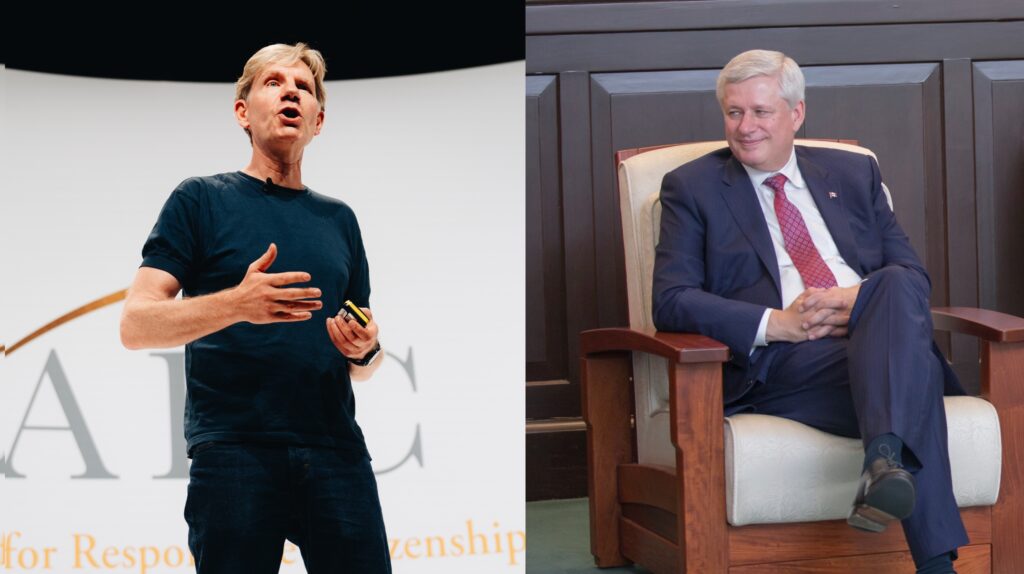On the face of things, there is no clear reason why the same person—like, say, Rick Perry–ought to deny accepted science about both evolution, and also global warming. After all, the fundamental reason or motivation for denying these things appears very different.
As has been clear for more than a century, the theory of evolution threatens a certain breed of religious belief. It clearly undermines a literal reading of the Book of Genesis, for instance. It suggests that God didn’t create people or make them out to be anything special. Indeed, if you think about it, it suggests that if God does exist, then God created humans through a bloody and brutal process (natural selection) that is full of death, pain, and cruelty over vast time-scales. (Great guy, this God, eh?)
Climate change has nothing—or at least nothing obvious–to do with this. That’s not to say climate science isn’t threatening; it is, but surely in a very different way. Modern climate science suggests that the free market, the source of so much economic growth and prosperity, also has a dark side. It suggests that humanity, left unchecked to exploit technology and maximize productivity, can really shoot itself in the foot sometimes. It suggests you need governments to step in and regulate, rather than letting the market rip.
In a socio-political vaccum, then, it is not at all clear why these two views should go together.
And yet in the specific political context of America, it’s equally clear that they often do.
Indeed, a new public opinion survey commissioned by the Public Religion Research Institute and Religion News Service puts quite a fine point on it. The survey looked at views on evolution and climate across political persuasions and across religious denominations. And it found that two groups in particular rejected science on both topics: political Tea Partiers and Republicans, and white evangelical Protestants. More specifically, some data:
- On evolution: Only 43 percent of Tea Partiers (and 45 percent of Republicans) accept the scientific reality of human and animal evolution, and only 32 percent of white evangelical Protestants do.
- On climate change: Only a small sliver of Tea Partiers and Republicans (18 percent) accept the scientific reality that humans are causing global warming, and only 31 percent of white evangelical Protestants accept the scientific reality that the Earth is getting warmer and humans are responsible.
What this suggests, of course, is that the evolution deniers and the climate deniers are often the same people. More specifically, it suggests that the political Tea Partiers (who are supposedly free markeeters and want smaller government) are somehow also threatened by evolution. And it suggests that white evangelical Protestants (who are supposedly oh so concerned about social issues, like abortion, the separation of church and state, and so on) are somehow also threatened by global warming.
WTF?
To ask why this is, of course, is simultaneously to ask why the social and economic parts of the political right always seem to hang out together. That is a vast question and an important one, and I don’t think I’ll get to the bottom of it here.
But we can certainly provide some clarity. For instance, the two parts of the right could be acting as team players. You scratch my back, I’ll scratch yours. If a friend tells you something, you’re more likely to trust it, right? On this account, economic and religious conservatives have been hanging out together so long—under the Republican party umbrella—that they’ve adopted one another’s favorite denialisms.
That’s one account, but there’s another possibility. This is that a deeper affinity exists between free market conservatism and religious conservatism than we might presume, so that the denialisms actually are connected, even if not in a logical or obvious way. For instance, I’ve written about how evolution deniers appear to be very closed minded—and Tea Partiers are also very sure that they’re right about global warming, and don’t think they need any more information about it. Could the two share similar habits of mind, and so have a natural affinity?
Honestly, I would postulate that both of these are true, and in a sense self-reinforcing. But I think that there also may be an even bigger motivator still. And that is not the core beliefs of either group, but rather, the dislike or even disdain in that both hold for the same “other”—e.g., a liberal university professor-slash-hippie environmentalist who accepts evolution, doesn’t believe in God, doesn’t work hard because of tenure (they think), and donates to the Sierra Club.
Perhaps the two parts of the right are united not only by core affinities, then, but also by a common enemy.
Subscribe to our newsletter
Stay up to date with DeSmog news and alerts







